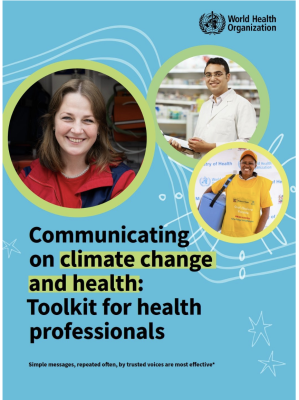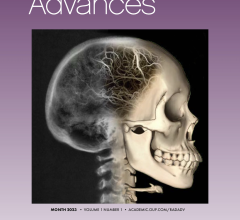
As the medical imaging community continues to shed a consistently bright spotlight on ways radiology impacts the environment and addresses sustainability, Imaging Technology News, ITN, is sharing ways leading healthcare organizations are addressing this critical issue. To that end, and with Earth Day approaching on April 22, what follows is an update from the World Health Organization (WHO) on a new toolkit it has designed to support healthcare workers. Image courtesy: WHO
April 10, 2024 — As the medical imaging community continues to shed a consistently bright spotlight on ways radiology impacts the environment and addresses sustainability, ITN is focusing on ways leading healthcare organizations are addressing this critical issue. To that end, and with Earth Day approaching on April 22, what follows is an update from the World Health Organization (WHO) on a new toolkit it has designed to support healthcare workers.
Climate change presents one of the most significant global health challenges and is already negatively affecting communities worldwide. The repercussions of climate change extend beyond physical health, impacting mental well-being through trauma, loss of livelihoods and anxiety about the future. WHO reinforces that communicating the health risks of climate change and the health benefits of climate solutions is both necessary and helpful. To that end, the World Health Organization (WHO), in collaboration with partners, has announced its development of a new toolkit designed to equip health and care workers with the knowledge and confidence to effectively communicate about climate change and health.
As noted by WHO in its announcement, climate change is a big threat to health, and implementing solutions to address climate change presents a huge opportunity to promote better health and protect people from climate-sensitive diseases. Health professionals are well-placed to play a unique role in helping their communities understand climate change, protect themselves, and realize the health benefits of climate solutions. To that end, notes WHO, its toolkit aims to help health professionals effectively communicate about climate change and health.
WHO reported that the toolkit aims to fill the gaps in knowledge and action among health and care workers – all those who are engaged in actions with the primary intent of enhancing health, as well as those occupations in academic, management and scientific roles. Despite their recognized trustworthiness and efficacy as health communicators, many health and care workers might not be fully equipped to discuss climate change and its health implications. This toolkit seeks to change that narrative.
“Health and care workers play a key role in addressing climate change as a health crisis. Their unique position enables them to raise awareness, advocate for policy changes, and empower communities to mitigate and adapt to climate change,” said Dr. Maria Neira, Director, Department of Environment, Climate Change and Health, WHO. She added, “By engaging in dialogue and action, health and care workers can catalyze efforts to safeguard human health as well as ensuring a resilient and sustainable future for all.”
Climate change affects health through various pathways, including extreme weather events, air pollution, food insecurity, water scarcity and the spread of infectious diseases. Heatwaves, changing weather patterns and air pollution contribute to a range of adverse health effects, including cardiovascular diseases, respiratory illnesses, mental health issues and malnutrition. Moreover, health systems face increasing strain from climate-related challenges, amplifying the urgency for action.
The toolkit provides comprehensive resources to help health and care workers understand the health impacts of climate change and the co-benefits of climate action, build confidence in communication, and engage with various stakeholders effectively, explains the WHO statement on the initiative. By empowering health and care workers to communicate about climate change and health, it aims to drive collective action towards mitigating climate change, building resilience and safeguarding public health.
The communications toolkit was developed by WHO in collaboration with the Global Climate and Health Alliance, George Mason University Center for Climate Change Communication, Medical Society Consortium on Climate and Health, Climate and Health Alliance Australia and the Canadian Medical Association. Health Canada's funding has been instrumental in developing this toolkit.
Five Climate Facts and Figures from WHO
1. The world is witnessing a concerning trend of warming temperatures, extreme weather events, water and food security challenges, and deteriorating air quality.
2. The frequency and intensity of these events are surpassing the capacity of both natural and human systems to respond effectively, resulting in far-reaching consequences for health.
3. Heatwaves, exacerbated by climate change, have been linked to adverse health effects, including heart attacks, kidney disease and mental health disorders.
4. Changing weather patterns threaten food security by reducing crop yields, while air pollution alone leads to over 7 million premature deaths annually, mainly through cardio-respiratory illnesses.
5. Health systems, already strained after a pandemic, an energy crisis and a cost-of-living crisis, face additional burdens from extreme weather events and supply chain disruptions.
The World Health Organization is composed of a team of 8000+ professionals which it reports represents the world’s leading public health experts, including doctors, epidemiologists, scientists and managers. WHO is an organization of 194 Member States. The Member States elect the Director-General, who leads the organization in achieving its global health goals. These individuals and entities coordinate the world’s response to health emergencies, promote well-being, prevent disease and expand access to health care, adding that “By connecting nations, people and partners to scientific evidence they can rely on, WHO partners strive to give everyone an equal chance at a safe and healthy life.”
More information: www.who.int


 April 24, 2024
April 24, 2024 








